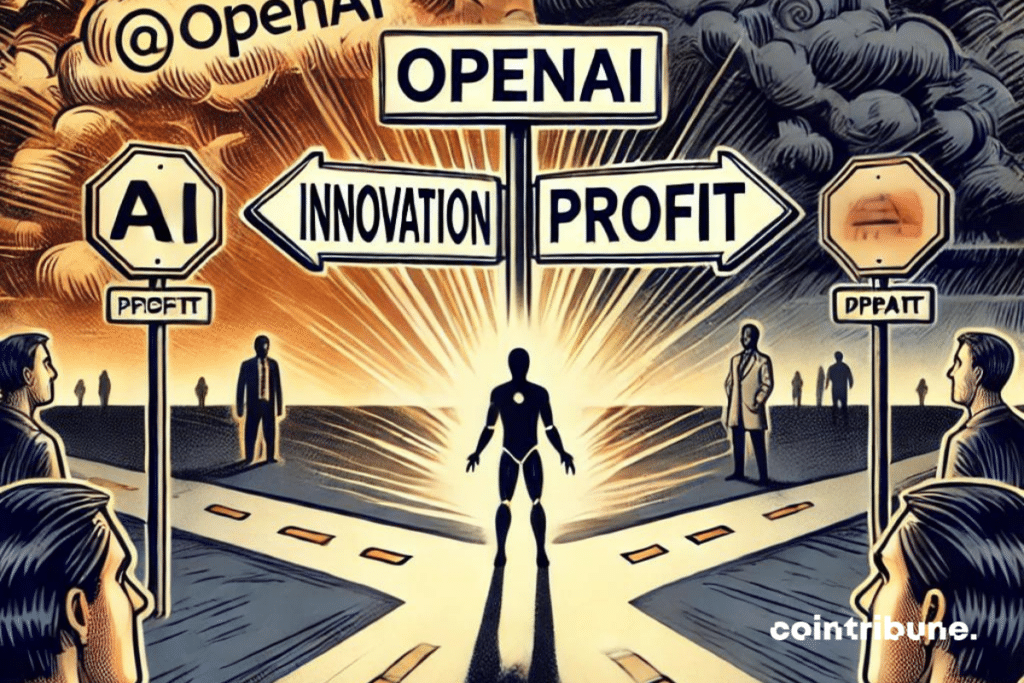AI: Is OpenAI Abandoning Its Founding Values, Making Strategic Errors, Or Pursuing Bold Choices?
OpenAI initiates a new historic step. Through its complete transformation into a for-profit entity, the company, once a pioneer in altruistic AI research, is disrupting its founding model. This decision, which constitutes a profound break in OpenAI’s history, comes at a time when technologies related to Artificial General Intelligence (AGI) are taking center stage in scientific and political debates worldwide.

A restructuring to attract investors
After the launch of its latest model o1 a few days ago, OpenAI, initially founded in 2015 as a non-profit organization, will now operate as a for-profit benefit corporation. This restructuring aims to attract new investors as the company prepares a $6.5 billion fundraising for an estimated valuation of $150 billion. Sam ALTMAN, the CEO of OpenAI, will for the first time receive shares in the company, a notable change in the organization’s governance. The company aims to focus on building AI that benefits everyone, and its teams are working with the board of directors to maintain goals and achieve success despite this transition.
Behind this decision lies a strategic necessity: attracting new capital to support the development of advanced technologies. Since the launch of ChatGPT in 2022, OpenAI has seen its value skyrocket, but to maintain this pace of innovation, the company must ensure a steady flow of funds. This restructuring allows offering more attractive guarantees to investors and minimizes the constraints of purely philanthropic governance. However, the resignations of key figures, such as Mira MURATI, the company’s CTO, and Greg BROCKMAN, co-founder of OpenAI, make this transition complex.
AI safety on the back burner?
If OpenAI’s transformation is driven by financial issues, it raises questions about AI safety. One of the most controversial decisions in this new phase is the dissolution of the “superalignment” team, a group dedicated to managing long-term risks related to Artificial General Intelligence (AGI). This choice is strongly criticized by several actors in the AI safety community, who fear that short-term objectives, dictated by profit-seeking, will compromise the company’s original mission.
Moreover, the loss of control by the non-profit foundation postpones the ethical commitments made by the company at its inception. OpenAI, which had set out to develop technologies beneficial to all humanity, could now prioritize financial goals at the expense of this vision. As discussions around AI regulations and oversight multiply around the world, this change could influence how regulators approach these sensitive issues.
This restructuring thus opens a new era for OpenAI, but it is not without risks. If the company manages to attract investors, it will also have to face criticism from those who see this shift as abandoning foundational values. The future of OpenAI will play out in a delicate balance between innovation, ethics, and profitability in a context where the stakes related to AGI far exceed the commercial framework.
Maximize your Cointribune experience with our "Read to Earn" program! For every article you read, earn points and access exclusive rewards. Sign up now and start earning benefits.
Diplômé de Sciences Po Toulouse et titulaire d'une certification consultant blockchain délivrée par Alyra, j'ai rejoint l'aventure Cointribune en 2019. Convaincu du potentiel de la blockchain pour transformer de nombreux secteurs de l'économie, j'ai pris l'engagement de sensibiliser et d'informer le grand public sur cet écosystème en constante évolution. Mon objectif est de permettre à chacun de mieux comprendre la blockchain et de saisir les opportunités qu'elle offre. Je m'efforce chaque jour de fournir une analyse objective de l'actualité, de décrypter les tendances du marché, de relayer les dernières innovations technologiques et de mettre en perspective les enjeux économiques et sociétaux de cette révolution en marche.
The views, thoughts, and opinions expressed in this article belong solely to the author, and should not be taken as investment advice. Do your own research before taking any investment decisions.